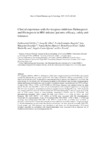Clinical experience with the integrase inhibitors Dolutegravir and Elvitegravir in HIV-infected patients: efficacy, safety and tolerance

Ver/Abrir
Use este enlace para citar
http://hdl.handle.net/2183/19670Colecciones
- Investigación (FCS) [1293]
Metadatos
Mostrar el registro completo del ítemTítulo
Clinical experience with the integrase inhibitors Dolutegravir and Elvitegravir in HIV-infected patients: efficacy, safety and toleranceAutor(es)
Fecha
2017-07-16Cita bibliográfica
Cid-Silva P, Llibre JM, Fernández-Bargiela N, et al. Clinical experience with the integrase inhibitors Dolutegravir and Elvitegravir in HIV-infected patients: efficacy, safety and tolerance. Basic Clin Pharmacol Toxicol. 2017;121(5):442-446
Resumen
[Abstract] Two integrase inhibitors (INSTIs), dolutegravir (DTG) and elvitegravir/cobicistat (EVG/COBI), have joined recently the pharmacotherapy arsenal against HIV. This study evaluated the efficacy and tolerability of these INSTIs in the last two years. A retrospective observational study in patients who started DTG or EVG/COBI from January 2015 to January 2017 at a reference hospital in north-western Spain was done. Epidemiological, clinical and immunovirological data were recorded. A statistical analysis was performed with SPSS software. A total of 542 DTG (n = 275)- or EVG/COBI (n = 267)-based therapies were initiated during the study period. Overall, more than 90% of naïve and pre-treated patients had virological suppression in both groups after 48 weeks of initiation of treatment per-protocol snapshot analysis. During follow-up, 10.2% of patients were treated with DTG and 4.5% of those treated with EVG discontinued due to adverse events (AE). In the case of DTG mainly related to neuropsychiatric disturbances (70.4%) and for EVG/COBI with gastrointestinal discomfort (50%). Female sex [HR 2.255 (95%CI 1.121–4.535), p = 0.023] and DTG treatment [HR 2.453 (95%CI 1.221–4.931), p = 0.012] were associated with AE discontinuations. Specifically for neuropsychiatric events, DTG treatment [HR 5.906 (95%CI 1.954–17.846), p = 0.002] and receiving abacavir/lamivudine/DTG [HR 4.380 (95%CI 1.348–14.233), p = 0.014] were identified as predictive risk factors for treatment discontinuations in two different multivariate analyses. A high percentage of AE discontinuations not previously described in clinical trials has been observed, especially with DTG. Female gender and DTG treatment were identified as risk factors for AE discontinuation. DTG-based therapies, especially in combination with abacavir/lamivudine, were associated with an increased risk of treatment discontinuation due to neuropsychiatric AE.
Versión del editor
Derechos
This is a peer reviewed version of the article which has been published in final form at Wiley Online Library. This article may be used for non-commercial purposes in accordance with Wiley Terms and Conditions for self-archiving.
ISSN
1742-7835
1742-7843
1742-7843





